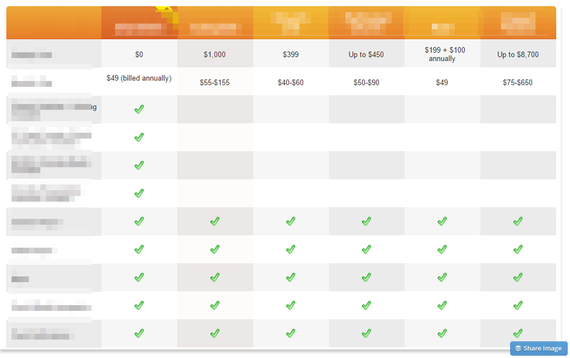Your customers are smart people. In fact, they might know more about your competitors than you do.
According to research, "81% of shoppers conduct online research before buying." In the B2B world, it's no different. "94% of B2B buyers research online for purchase decisions" (source).
They've done their research and made comparisons.
You, as the ecommerce seller, must understand this, accept this, and deal with this appropriately.
So, what's the secret? Since customers are fully aware of your competitors, know the prices, and understand the various benefits and features, how are you going to stand out?
Don't make comparison charts.
Have you seen those charts that demonstrate how much more awesome company A is than company X, Y, and Z?
It's called a competitive matrix, and it's a bad idea to show to your customers.
A competitive matrix tells customers that you are the best, and to forget the rest. But there's a problem with this. It doesn't work.
According to a Stanford study, customers who are asked to compare a product with the competition usually don't. Explicit comparative advertising "caused [customers] to fear that they were being tricked in some way" (Source: Stanford Study).
Lead researcher Itamar Simonson said this regarding the study: "The very fact of being told to make the comparison made people much more risk averse."
Your customers already know about the competition. They will make the comparison on their own.
Don't mention your competitors.
Even mentioning your competition is a bad idea.
When you mention your competition, you introduce an unexpected variable into the customer's thinking.
Before you mentioned Competitor A, the customer:
- May not have known about the competition
Now, your customer is wondering why you mentioned them. Are they better? Is there something that I don't know about them? Maybe I should check them out!
When you mention the competition, you introduce cognitive friction -- "any variable, website quality, or user behavior trend that is slowing down (or entirely halting) the progression of your company's sales cycle" (definition source).
Online marketing veterans know and fear the constant reality of friction. The best way to avoid this type of competitive friction is to leave off any mention of your competitors.
Do don't badmouth your competitors.
There is something still worse than either comparing or mentioning: badmouthing.
Badmouthing can seem sophisticated. You're simply "pointing out the competitor's weakness," or "helping the customer avoid a mistake."
In essence, you're operating from a point of frustration toward the competition. Such actions will drag you down. Customers can spot it, and they don't like it.
Customers are wooed by positivity, not competitor bashing.
Emphasize your key differentiator.
If you can't show that you're better than the competition, mention them, or smear them, then how do you deal with your competitors?
You could ignore them, but there's a better strategy: focus on yourself and why your business stands out.
The key differentiator can be defined as: "The business attribute(s) and/or unique value that clearly separates it from the competition in a particular marketplace."
Another approach is the unique selling proposition, value proposition, or just USP. A USP "is a sentence that tells your visitors why they should buy from you and not your competitors."
Don't mention the competition. Simply talk about:
- The problems your product solves
If you have a strong USP, you'll stand out from the competition without needing to worry about them.
Deliver unparalleled customer service.
Customers crave service beyond just about anything else.
Regardless of your industry, niche, product, or service, your customers want top notch service.
If you can provide customer service better than any other company in the industry, customers will come flocking to you. In fact, 85% of customers are willing to pay more for improved customer service.
That's a huge number of people who will shell out more cash for better treatment.
Now, here's the opportunity: 64% of brands don't provide good customer service.
And here's the clincher: 89% of customers will switch to the competitor after a poor service experience (Statistics source).
Give your customer service before they even become a customer. Remember how Zappos experienced meteoric growth? They did so based on their outstanding reputation for customer service. Through word of mouth and a fanatical tribe, they attracted millions of new customers. You can do the same.
Provide superior customer service and you win.
Learn about your customers.
My final point is the most important: Know your customers.
Just as your customers know about the competition, you should know about your customers.
Using surveys, analysis, interviews, and meetings, find out two major things about your customers:
- What do they really want?
The more you know about your customers' drives, interests, passions, budget, income, family situation, dreams, aspirations, idiosyncrasies, and pet peeves, the more skilled you will become at delivering exactly what they need.
Conclusion
Customers deserve much more credit than we tend to give them.
They're simply trying to make the best choice possible in a crowded marketplace. They need answers, solutions, and clarity.
Playing whack-a-mole with the competition is a waste of time. It's far better to set the competition aside, focus on our key differentiators, and wow the socks off our customers.
I guarantee it will make a positive difference in your business.
How do you handle customers' knowledge of the competitors?

